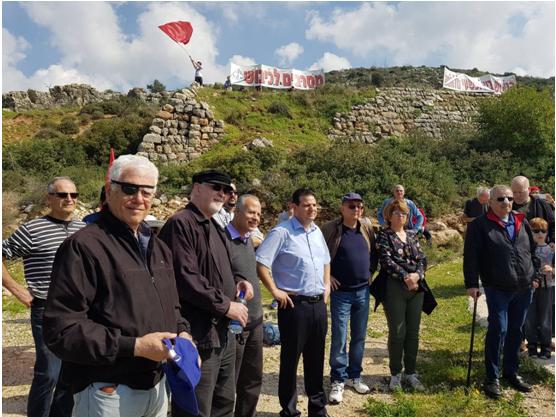AMEC (The Afro-Middle East Centre of South Africa) hosted in Johannesburg last week a seminar entitled “Resistance from Within: Palestinian Citizens of Israel and the Struggle for Democracy, Equality and Justice.” Speakers included MK Ayman Odeh, Mustafa Abu Raiya and Ran Greenstein; the seminar was chaired by Tasneem Essop. “We’ve come to spread our cause in South Africa because South Africa has experienced apartheid; it has a conscience, and we need its solidarity,” head of the Joint List MK Ayman Odeh (Hadash) said in an interview with South-African The Daily Vox.

MK Ayman Odeh (center in light blue shirt) with former Hadash MKs Issam Makhoul (second from left, with black cap) and Abdallah Abu-Marouf (between Odeh and Makhoul) during a demonstration in front of Military Prison 6 in solidarity with 3 youths who are serving sentences for refusing induction into the Israeli military because of their opposition to the occupation, February 24, 2018. (Photo: Al Ittihad)
Following is a portion of that interview:
How has the Joint List given you influence?
The most important thing is for us [the Palestinian-Arab citizens of Israel] to be legitimized as a group in the political process. I think the current prime minister, Benjamin Netanyahu, understands this equation because he was head of the opposition when Yitzhak Rabin was became prime minister [in 1992]. Rabin did not have a majority in parliament; he had only 56 seats out of 120. With our five seats [at the time, offering to support the coalition but not joining it], Rabin held the majority in parliament. Netanyahu claimed that this was not a legitimate government because Rabin did not receive the majority of the Jewish vote. When Netanyahu ran against [and defeated] Shimon Peres in 1996 the gap between them was only 30,000 votes; and when Netanyahu ran against [and lost to] Ehud Barak in 1999, Barak took 56% and Netanyahu 44%, which means Netanyahu took the majority of Jewish vote but not those of all the citizens. [Before the last general election in 2015] Netanyahu understood that if we, the Arabs, are legitimized, it will be difficult for him to form a coalition because he will have to convince at least 65% of the Jews to vote for him. If we were not legitimized, he only had to convince 51% of the Jews to form a government. ]Based on this,] I think we can understand why he raised the threshold [requiring any list to gain at least 3.25% of the vote to enter the Knesset, as opposed to the previous 2% threshold]. Our answer was to form the Joint List [that included Hadash and three Arab parties].
The Joint List made headlines for its protest against US Vice President Mike Pence’s address to the Knesset in January. What was that all about?
We wanted to make the point that it is not only 129 countries that voted [in the UN General Assembly] against Trump’s decision to recognize Jerusalem as Israel’s capital. We wanted to point out the third largest party in Israel, the Joint List [with 13 Knesset members], is against Trump as well. We wanted to strengthen the power of the American people who oppose Trump. Our protest against Pence was all over the media worldwide and succeeded in its message. It put Trump in a bad spot.
What do you think of Trump’s populist policy and what effect does it have on the situation in Israel/Palestine?
Trump’s decision to remove Jerusalem from the negotiation table [in effect] removed both himself and America from the negotiation table. Jerusalem is Jerusalem. It is Palestinian and Arabic in its tradition and its people. It belongs to its people, the Palestinian people. One hundred and twenty nine countries support it as the Palestinian capital under international law. Trump’s declaration brings us back to square one ― that Palestinian leaders should rely on the Palestinian people.


